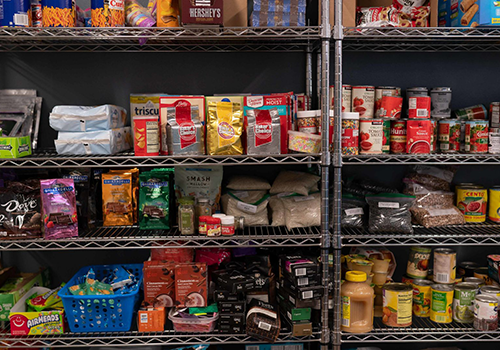Merced College students needn’t go hungry.
That’s not a goal. That is the uplifting truth behind the student food pantry, which came to campus full time in 2017.
“I visit close to every day, and I try my best to not take more than I need,” said one student, who wished to remain anonymous. “I am grateful for the food pantry, not only for what it’s done for me, but also for the people I’ve been able to refer to it as a student worker.”
The food pantry exists in the college’s new Basic Needs Center. First funded by donations and now by state funds, it filled gaps for roughly 5,000 students this semester.
Students can grab a snack and drink every day, and receive one bag of groceries each week. If that’s not enough, staff also have grocery gift cards to share. There are professional clothes and regular clothes to borrow, and information about other resources.
Food insecurity is a deterrent to student success at all levels of education. So the ramped-up effort on campus is vital to support students who live in the fourth poorest county (by per capita income) in California.
“Before the pandemic, we already had great people working in student health, EOPS, veteran’s services, with foster students,” said Joe Serena, Dean of Student Equity and Success. “But basic needs help is here for all students.”
Merced College first opened a student food pantry in 2017 out of a closet in the student union. It promptly outgrew that space, and the pantry was relocated to a Seatrain container behind the gym in 2018.
The college moved the food pantry back into the student union in January of this year. It was open one day per week during the heavily COVID-affected spring semester, and five days per week this fall as students returned to campus.
The State of California allocated $30 million for the 2021-22 academic year for community colleges to establish basic needs programs. To receive money, colleges must have a center, a coordinator, and information on resources for housing, food, mental health and guidance to apply for CalFresh or to access other food banks. Community colleges must put those requirements, and others, in motion by Feb. 1, 2022.
Merced College is ahead of that deadline. Not only is there already a main campus pantry in the Student Union, Room 104, but there’s a second one being built in Building A, Room 129, at the Los Banos Campus, and a third in the works at the Business Resource Center in downtown Merced. The college stretches funds for these efforts, but also relies on donations like personal hygiene products, food staples and cash to do more.
Starting in January, the program’s engine, Student Services Coordinator/Basic Needs Coordinator Shannon Gragg will coordinate the basic needs program full time.
“I’m happy to be transitioning over,” Gragg said. “I’ll have more time to get out into the community and identify more resources. I’m anxious to devote all my time to it.”
The college is ready, too. Back in March 2021, it took an additional step by evaluating its student services via the Merced College Student Financial Needs & Pandemic Survey. From 331 responses, it confirmed that many students were struggling with money, food and rent.
The survey showed that, in the previous 30 days, one in five students skipped at least one daily meal because they couldn’t afford food. Another 22% couldn’t pay their utilities and roughly 5% were homeless.
But 46% also said they sought and received help at Merced College.
“Students are so thankful,” Gragg added. “We even get so many graduates who then want to donate to give back. That is awesome.”
Merced College employees do their part. It showed when school administrators attended a fall graduation ceremony for EOPS students and heard students tell their stories.
One student was a single mother and a DACA student. Born in Mexico and from an abusive home, she described student support staffers going above and beyond to get her meal cards, gas cards and more. Without them, she said, she couldn’t have graduated.
The Basic Needs Center has a powerful action plan: Feed, clothe and house Merced College students, and clear their path to graduation.
“We know many factors play into how well students do,” Serena said. “We know any problem can make their journey more difficult. So, when they graduate, we know so much went into it, including us making sure we’re there for them. The bottom line is Merced College has people who care.”
Call the Merced College Foundation at (209) 384-6030 to inquire about dropping off donations, or mail checks made out to the Merced College Foundation — 3600 M Street, Merced, CA, 95348-2898 — with “Basic Needs Center” written on the memo line.
